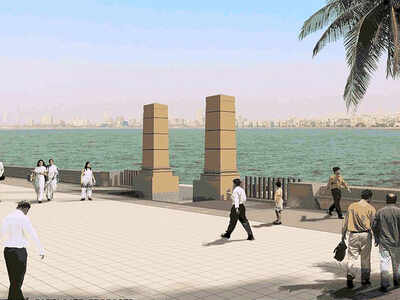- News
- City News
- mangaluru News
- Rise in sea level to impact Mumbai more than Mangaluru
Rise in sea level to impact Mumbai more than Mangaluru

Picture for representational purpose only.
MANGALURU: Though the impact of sea level rise will be felt across the globe, the coastal city of Mangaluru seems to be better off than Mumbai and Kerala on the West Coast of India.
The effect will be more pronounced on the northern part of the West Coast – Mumbai- than southern parts – Mangaluru. This is according to a research paper published by the Department of Marine Geology, Mangalore University, three decades back. It predicts the northern part of the west coast is characterised by extensive tidal flats and mud-flat deposits that indicate submergence, whereas tide gauge data corroborate uplift of the land around Mangaluru relative to Mumbai and Kochi.
Though the research by BR Manjunatha and R Shankar, department of Marine Geology, was on "Factors controlling the sedimentation rate along the western continental shelf of India," it offers a corollary on the impact of sea level rise. R Shankar, member, International Union of Geological Sciences' Commission on Geosciences Education, Training and Technology Transfer (IUGS-COGE), told TOI the uplift of land due to sedimentation may delay the inevitable here. The paper notes suspended particulate matter (SPM) concentrations in the river's southern area are significantly lower than those for the northern area. For example, the SPMs in the Nethravati and Gurpur (53.85 and 52.28mg/I) rivers are about two orders of magnitude lower than those in the Narmada and Tapti rivers.
"Global warming due to harmful emissions not only melts ice caps, but also expands sea water contributing to temperature increase and sea level rise. In this part of the West Coast, the sediment deposition is low in Mangaluru coast (0.72mm/year) as against 2.60 mm/ yr off Karwar and 2.50 mm/yr off Mumbai. Over time continuing sedimentation in the water and the additional weight causes subsidence (sinking)," says Shankar. "We have done the damage and results are seen," advocating four R's – Refuse, Reduce, Reuse and Recycle; applied to five types of resources: water, fuel, food, power, metals to be judiciously used to delay the inevitable.
But the effect of sea rise due to increasing temperatures will have a far reaching effect on the livelihood of fisherfolk and marine resources.
The policy brief by E Vivekanandan of the Central Marine Fisheries Research Institute (CMFRI) on "Climate Change and Indian Marine Fisheries," published a decade back, notes that depending on the marine species, the area it occupies may expand, shrink or be relocated. "This will induce increases, decreases and shifts in the distribution of marine fish, with some areas benefiting while others losing," indicating climate change and sea level rise will have a profound impact on fishing community and its resources, apart from impact on mangroves and creating environment, particularly suited to Harmful algal blooms.
The effect will be more pronounced on the northern part of the West Coast – Mumbai- than southern parts – Mangaluru. This is according to a research paper published by the Department of Marine Geology, Mangalore University, three decades back. It predicts the northern part of the west coast is characterised by extensive tidal flats and mud-flat deposits that indicate submergence, whereas tide gauge data corroborate uplift of the land around Mangaluru relative to Mumbai and Kochi.
Though the research by BR Manjunatha and R Shankar, department of Marine Geology, was on "Factors controlling the sedimentation rate along the western continental shelf of India," it offers a corollary on the impact of sea level rise. R Shankar, member, International Union of Geological Sciences' Commission on Geosciences Education, Training and Technology Transfer (IUGS-COGE), told TOI the uplift of land due to sedimentation may delay the inevitable here. The paper notes suspended particulate matter (SPM) concentrations in the river's southern area are significantly lower than those for the northern area. For example, the SPMs in the Nethravati and Gurpur (53.85 and 52.28mg/I) rivers are about two orders of magnitude lower than those in the Narmada and Tapti rivers.
"Global warming due to harmful emissions not only melts ice caps, but also expands sea water contributing to temperature increase and sea level rise. In this part of the West Coast, the sediment deposition is low in Mangaluru coast (0.72mm/year) as against 2.60 mm/ yr off Karwar and 2.50 mm/yr off Mumbai. Over time continuing sedimentation in the water and the additional weight causes subsidence (sinking)," says Shankar. "We have done the damage and results are seen," advocating four R's – Refuse, Reduce, Reuse and Recycle; applied to five types of resources: water, fuel, food, power, metals to be judiciously used to delay the inevitable.
But the effect of sea rise due to increasing temperatures will have a far reaching effect on the livelihood of fisherfolk and marine resources.
The policy brief by E Vivekanandan of the Central Marine Fisheries Research Institute (CMFRI) on "Climate Change and Indian Marine Fisheries," published a decade back, notes that depending on the marine species, the area it occupies may expand, shrink or be relocated. "This will induce increases, decreases and shifts in the distribution of marine fish, with some areas benefiting while others losing," indicating climate change and sea level rise will have a profound impact on fishing community and its resources, apart from impact on mangroves and creating environment, particularly suited to Harmful algal blooms.
FacebookTwitterLinkedinEMail
Start a Conversation
end of article
Quick Links
Delhi Air PollutionDelhi TemperatureChennai WeatherBangalore TemperatureCovid vaccination centres in DelhiCoronavirus in DelhiRTPCR test in GurgaonHyderabad RainPollution level in BangaloreDelhi SmogDelhi TemperatureNoida AQIGurgaon AQI todayFire in MumbaiMumbai RainsCovid 19 RT PCR Test in NoidaDelhi AQI todaySrinagar encounter

